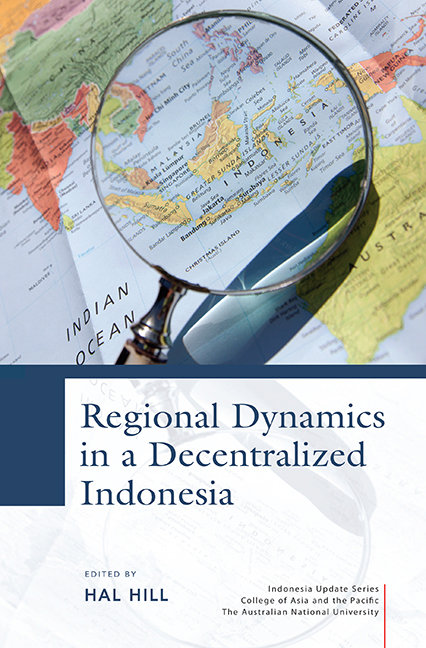Book contents
- Frontmatter
- Dedication
- Contents
- Tables
- Figures
- Contributors
- Acknowledgments
- Glossary
- Map of Indonesia
- 1 An introduction to the issues
- PART 1 HISTORICAL, ECONOMIC, POLITICAL AND SOCIAL PATTERNS
- PART 2 DECENTRALIZATION AND GOVERNANCE
- 6 Twelve years of fiscal decentralization: a balance sheet
- 7 Local governance and development outcomes
- 8 Decentralization, governance and public service delivery
- 9 What determines the quality of subnational economic governance? Comparing Indonesia and Vietnam
- PART 3 LOCAL-LEVEL PERSPECTIVES
- PART 4 MIGRATION, CITIES AND CONNECTIVITY
- PART 5 CHALLENGES FOR INDONESIA'S PERIPHERY
- Author index
- Subject index
- INDONESIA UPDATE SERIES
8 - Decentralization, governance and public service delivery
from PART 2 - DECENTRALIZATION AND GOVERNANCE
Published online by Cambridge University Press: 21 October 2015
- Frontmatter
- Dedication
- Contents
- Tables
- Figures
- Contributors
- Acknowledgments
- Glossary
- Map of Indonesia
- 1 An introduction to the issues
- PART 1 HISTORICAL, ECONOMIC, POLITICAL AND SOCIAL PATTERNS
- PART 2 DECENTRALIZATION AND GOVERNANCE
- 6 Twelve years of fiscal decentralization: a balance sheet
- 7 Local governance and development outcomes
- 8 Decentralization, governance and public service delivery
- 9 What determines the quality of subnational economic governance? Comparing Indonesia and Vietnam
- PART 3 LOCAL-LEVEL PERSPECTIVES
- PART 4 MIGRATION, CITIES AND CONNECTIVITY
- PART 5 CHALLENGES FOR INDONESIA'S PERIPHERY
- Author index
- Subject index
- INDONESIA UPDATE SERIES
Summary
INTRODUCTION
Has Indonesia's decentralization in 2001 been successful at improving service delivery and governance quality at the local level? Has democratization in the districts helped foster the quality of public services? More than 10 years into decentralization, we are able to provide an assessment based on systematic empirical evidence from the districts. This chapter reports results from large panel data analyses studying the effects of decentralization and local democratization on government spending (Kis-Katos and Sjahrir 2014), on governance quality (Sjahrir, Kis-Katos and Schulze 2014) and on public service delivery (Schulze and Sjahrir 2014). A synopsis of these three perspectives allows a well-rounded, balanced picture of the impact of these two far-reaching structural reforms on the quality of local government behaviour. It allows us to portray and identify the effects of these reforms on the production process for public services, comprising inputs, technology (governance) and output.
The effect of decentralization and democratization on the quality of government behaviour has been a contentious issue in the academic debate, both theoretically and empirically. The first generation of the fiscal federalism literature stressed that decentralization allowed easier generation of location-specific knowledge and better preference matching (Hayek 1948; Oates 1972 and others); moreover, mobile individuals could sort themselves into the jurisdictions that offered the best mix of public services and taxes for them (Tiebout 1956). The second generation has focused on the effects of decentralization on accountability and the political process in general. Inter-jurisdictional competition for mobile factors (firms and individuals) curbs the ability of local governments to exploit their citizens and forces them to provide better services to attract these mobile factors (Brennan and Buchanan 1980). As decentralization brings decisions closer to the people, the transparency of and participation in the political process should be enhanced. Incumbents seeking re-election will be disciplined, at least partially, by the requirement to secure a majority of the vote (Ferejohn 1986). Decentralization implies unbundling of public goods provision, both regionally and by government function, which allows citizens to hold decision makers more directly accountable (Seabright 1996; Farfán-Vallespín 2014). Whereas, under centralization, a local constituency can hold the (central) decision maker accountable only in cooperation with other constituencies representing at least half the population, under decentralized rule a local constituency can hold its (local) decision maker directly accountable.
- Type
- Chapter
- Information
- Regional Dynamics in a Decentralized Indonesia , pp. 186 - 207Publisher: ISEAS–Yusof Ishak InstitutePrint publication year: 2014

